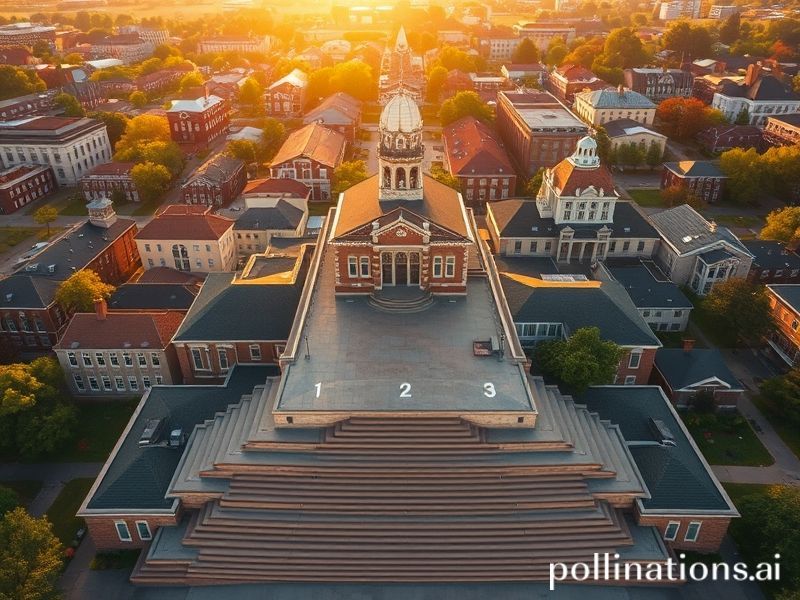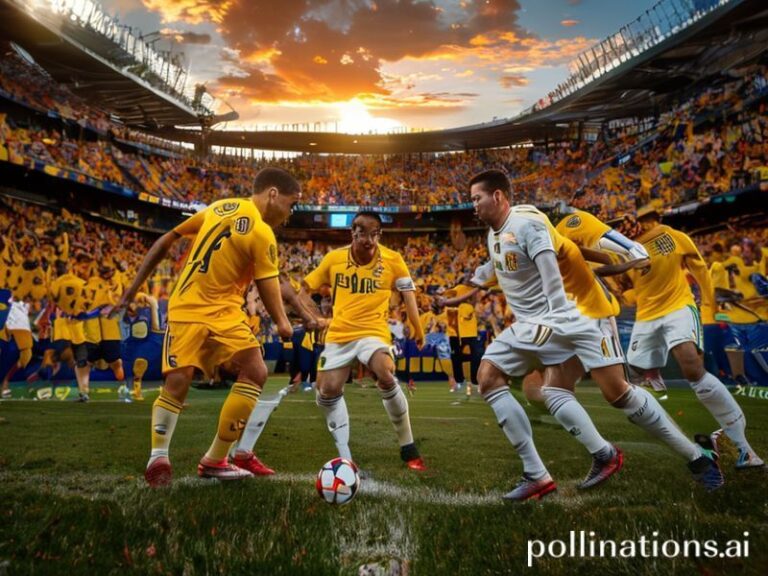University Rankings Are Global Gladiator Games—With Libraries Instead of Lions
The Global Hunger Games of Higher Education: How Rankings Turn Universities into Panic-Stricken Beauty Queens
By Eduardo Valdez, Dave’s Locker Senior Correspondent (and occasional adjunct)
Somewhere between the Suez Canal and a Zoom breakout room, the modern university lost its soul and found a spreadsheet. Each September, QS, THE, ARWU, and a small army of lesser acronyms release their annual beauty pageants—sorry, rankings—sending presidents from São Paulo to Seoul scrambling for adjectives like “prestigious,” “world-class,” and “up three places despite budget cuts.” The ritual is as predictable as a North Korean missile test and only marginally less explosive.
This year’s plot twist arrived courtesy of mainland China, whose universities now occupy more top-100 slots than the entire European Union. Cue polite gasps in Paris lecture halls and the soft thud of monocles dropping into Bordeaux. Meanwhile, American deans reassure alumni that “brand equity” still beats “Communist algorithms,” a phrase they pronounce while quietly hiring the same Chinese post-docs who wrote the algorithms.
The rankings themselves are masterpieces of bureaucratic origami. They weigh “citations per faculty” (because nothing says excellence like mutually assured citation), “international outlook” (a euphemism for flying in tuition-laden foreigners), and “industry income” (how fast you can turn graphene research into a smartphone battery that lasts an entire lecture). All metrics are normalized, adjusted, and regurgitated until even the Dalai Lama would look like a mid-tier polytechnic if he failed to publish in Nature.
Consequences ricochet across continents with the elegance of a drunk billiard ball. In Nigeria, parents now sell land to send children to “top-500” schools in Malaysia because Lagos State University slipped to 1,203rd. In Australia, vice-chancellors fire whole departments of philosophers—useless souls who stubbornly refuse to attract corporate grants—while erecting glass atria named after cryptocurrency exchanges. In Switzerland, ETH Zurich buys a €200 million supercomputer to simulate the universe but still can’t simulate a campus canteen that serves warm schnitzel, proving that excellence has its priorities straight.
The dark punchline? Rankings don’t measure learning; they measure the ability to game the rankings. Universities stuff faculty CVs with “honorary co-authorship,” court Nobel laureates the way Renaissance popes courted mistresses, and inflate class sizes until seminars resemble Turkish bazaars. One Ivy League school allegedly offered incoming freshmen free pizza for every Instagram post tagged #Top20. The pizza was vegan; the cynicism was not.
Poor countries suffer the cruelest joke. When Kenya’s University of Nairobi tumbles fifty places, the World Bank cites “insufficient research output” and withholds a $50 million loan. Weeks later, MIT receives a $100 million donation from a hedge-fund vampire whose sole publication is a tax shelter in the Cayman Islands. Global equity, ladies and gentlemen.
And yet, like moths to a halogen lamp, we keep circling. Students from Jakarta to Jackson stake their futures on a decimal point. Governments rewrite immigration policy around league tables: Canada fast-tracks visas for graduates of “top 50” schools, inadvertently welcoming the same Hong Kong prodigy who will later emigrate to Palo Alto and drive Vancouver rent prices into geostationary orbit.
Perhaps the ultimate irony is that the most “international” universities are becoming gated communities of the global elite. Walk through any “top-20” campus and you’ll hear more Mandarin than the local dialect, more Hermès than homelessness. Meanwhile, tuition climbs faster than a SpaceX rocket, and graduates exit clutching degrees whose value deflates quicker than a Brazilian real in an election year.
Conclusion: The rankings will persist because humans love a scoreboard more than we love education itself. Someday archaeologists will excavate the ruins of a once-great university, find a tarnished QS plaque, and muse: “They must have been very important—look, they were 37th in 2024.” Until then, keep your passports ready and your citations indexed; the pageant never ends, and the swimsuit competition is brutal.







